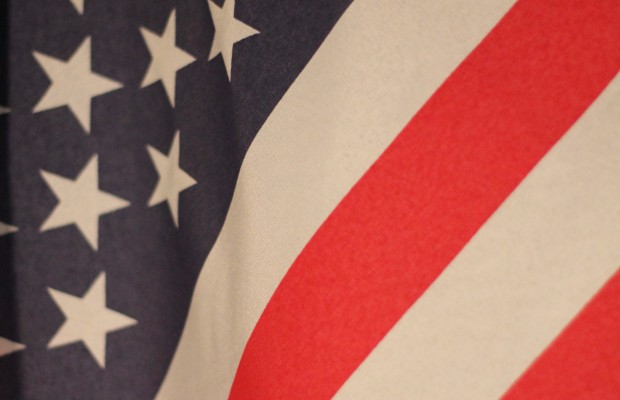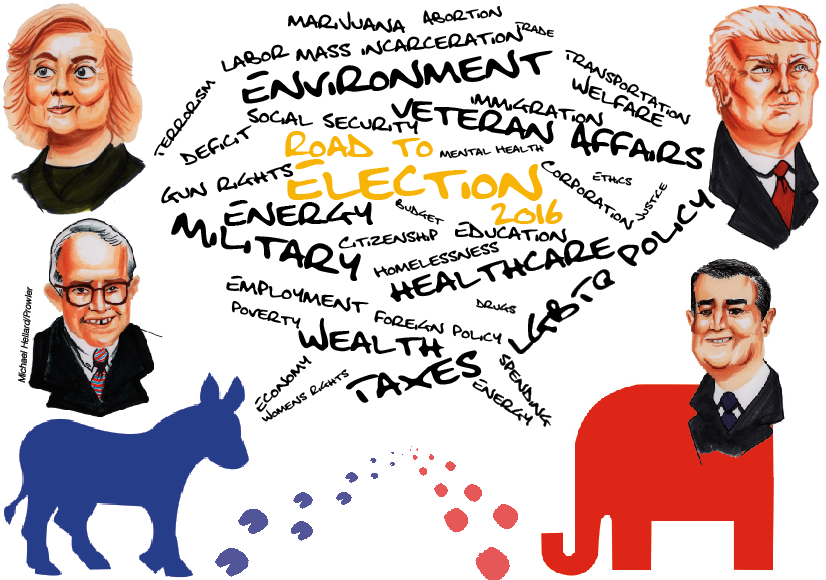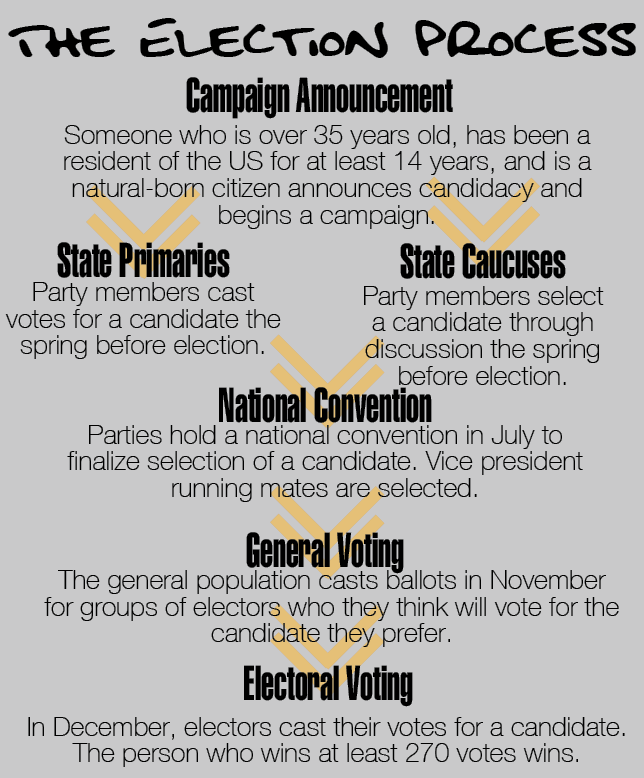Road to Election 2016

Caucuses: Do they matter?
For students who spend time on any media outlet, it’s impossible to scroll through Twitter or switch to a news channel without hearing something about the 2016 candidates and their fight to the primaries. In between hearing angry remarks about Donald Trump and statements about why we shouldn’t trust Hillary Clinton, we also hear the word “caucus;” an important part of the primaries process that the media constantly analyzes and advertises.
The main purpose of the caucasus is for the candidates to win over the state delegates, with the process eventually leading up to the primaries. Many people believe that the first few wins from the caucuses can be significant to the outcome of the race.
“I believe that caucuses are more important to a political race when there are more candidates running to become the party nominee since the caucuses then become a process to weed out the less favorable candidates and allow later states to choose,” Anastasia Pyrinis, senior and an active campaign worker, said.
Similar to Pyrinis, Sonia Patel, junior, believes that the “caucuses are essential to the race so the nation can see the opinions of multiple states and figure out who the frontrunners will be.” However, students like senior Ethan Stein don’t see them as an essential part of the political process.
“It’s not as important as the vote itself but it just gives you an idea of who people want as their forerunner. But in the end the forerunner could be someone completely different than who’s winning the caucus at the moment,” Stein said.
Like Stein, Pyrinis also questions the true purpose of the caucuses.
“I do believe that the first few caucuses are instrumental later on in the race for one chief reason: money,” Pyrinis said. “Money is what allows a campaign to continue – without it, a candidate would drop… Those who receive few votes and finish weak in the first few caucuses will suffer from a lack of funding and will eventually be “forced” to drop out from the race due to that lack of funding.”
Gary Fabricus, Government and Economics Teacher, sees the importance of the caucuses, but he also has concerns about the methods used to get the results.
“I have a problem with starting off in small states that have very little electoral college votes, and they start dictating who the front-runner is,” Fabricus said. “Iowa and New Hampshire, are you kidding me? Who lives in Iowa and New Hampshire? There’s more people that live in the Conejo Valley, I think.”
With the variety of opinions surrounding the caucuses and the unclear depictions of what the actual process is and means, it’s not surprising that many teenagers don’t understand the significance of the tradition.
“Most students are probably not aware of how they work,” Fabricus said. “I think most citizens are probably not aware of how they work.”
While Patel believes that “younger voters will be swayed based on the winners of the first few caucuses since they will not have time to watch them all,” Stein thinks that most teenagers don’t see their importance.
“I don’t think that our youth is very involved in politics, so I don’t think they would really pay attention,” Stein said. “I think they only pay attention to … how everyone’s blowing up about Clinton and Trump…They only pay attention to the big party candidates.”
As the caucuses continue leading up to the primaries, students like Pyrinis hope that teenagers find a way to stay more politically informed and active.
“Statistics have shown that ages 18-25, the youth of the nation, is the age group that is least likely to participate in the political process,” Pyrinis said. “I find this appalling because I firmly believe that all students should care, even just a little bit, about the political process because in the end, everything a government does, everything that politicians do, affects us all.”
Voting in the primaries as a 17 year old
While in many other states, it is possible for 17 year olds who will be 18 by the general election to vote, this is not legal in California. On the democratic side, it is difficult to predict with much certainty whether Bernie or Hillary is more likely to win, as the race is very close. On the republican side, it is even more difficult to predict which candidate is more favorable, as among the three to four top candidates, there is varying favor in each state. This year, more than ever, the ability of some 17 year olds gaining the right to vote in all states can possibly make a difference in who competes in the general election.
Kristen Ho, senior, who will turn 18 just after the state primaries, strongly supports Bernie Sanders. “I think that Hillary Clinton is very closely embedded with Wall Street. She and her husband were the people who pushed the policies which led to a huge increase in people in prison for minor crimes,” Ho said. “I think Bernie Sanders most closely aligns with my values.”
Many people, including Ho, believe that giving 17 year olds who will be 18 by the general election the ability to vote in the primaries could perhaps affect who would be chosen to compete in the general election. “While, on one hand, our age demographic most overwhelmingly supports Bernie Sanders, it is also the demographic least likely to vote. But I think it could have an effect,” Ho said.
Shriya Kelly, senior, who will be 18 just before the general election, agrees. “Especially with Sanders … if some of (the younger voters) could get politically active and if the ones who are not allowed to vote because of their age could vote in the primaries, then that could possibly be a huge help (to his candidacy).”
Dillon Snow, senior, also believes that 17 year olds who plan to vote in the generals should be able to vote in the primaries. However, he prefers Trump, because “Trump is one of the only ones who seeks to take immediate action on illegal immigration,” Snow said.
As the republican race has recently swung in favor of Ted Cruz, 17 year olds like Snow could, if given the ability to vote, affect who might win the primaries.
The 2016 election so far has been unpredictable. On the Republican side, Trump once dominated, but Ted Cruz has made it close with his win in the Iowa Caucus. On the Democratic side, Clinton and Sanders remain too close to call. In a year where the race on both sides is so close, giving 17 year olds who will be 18 by the general election the ability to vote in the primaries could very easily change who might represent each party.
The underrepresented third parties
The race for the presidency is in full swing, and the Democratic and Republican parties are neck and neck. However, with these two titans slugging overhead, it’s easy to forget the smaller third parties that also contribute to the U.S. political system. The three major U.S. third parties, the Libertarian Party, the Green Party, and the Constitution Party deserve recognition as well.
Libertarian
The Libertarian Party is the most popular third party in the U.S. They have 368,561 members as of 2014. The Libertarians currently hold 39 partisan offices and 102 non-partisan offices. The party has yet to elect a presidential candidate but plan to at the Libertarian Party national convention on May 26, 2016.
According to the Libertarian’s written platform, they “Seek a world of liberty; a world in which all individuals are sovereign over their own lives and no one is forced to sacrifice his or her values for the benefit of others.”
Libertarians are liberal on social issues. “Sexual orientation, preference, gender, or gender identity should have no impact on the government’s treatment of individuals,” says their platform. On abortion, the party states “We believe that government should be kept out of the matter, leaving the question to each person for their conscientious consideration.”
Regarding the economy, however, the Libertarian Party is consistently right-wing. “The repeal of the income tax, the abolishment of the Internal Revenue Service and all federal programs and services not required under the U.S. Constitution,” says the party’s platform. Libertarians also advocate that persons “Should be left free by government to deal with one another as free traders.”
Green
The Green party is the second most popular third party with 248,189 members as of 2014. They hold over 100 U.S. offices and have a running presidential candidate, Dr. Jill Stein.
Peace and Non-Violence, Ecological Wisdom, Grassroots Democracy, and Social Justice are the four pillars of Green ideology which was created by the original German Greens in 1980. The Green ideology expands to ten pillars with the addition of decentralization, community-based economics, feminism, respect for diversity, global responsibility, and future focus.
The Green Party puts a large emphasis on ailing the “…Numerous anti-democratic policies that are specifically designed to prevent the most oppressed sectors of our society from participating in the electoral process.”
As posted on the party website, “Students and young people, African-Americans, poor people, and the elderly all face tremendous barriers, such as voter ID laws, disenfranchisement of ex-offenders, and restrictive residency requirements, among others.”
Another important issue to the Green Party is rethinking campaign funding.
“The “Cromnibus” must-pass spending bill that went to Congress in December 2014 included… a ten-fold increase in the amount of money people can give to party committees,” says the party’s platform, “One-tenth of one percent of all tax returns in 2011 showed income of a million dollars or more (about 235,000 people). So there are very few people who could possibly hit these new campaign contribution limits.”
Constitution
The Constitution Party is the third most popular third party in the U.S.. The party has 76,425 members as of 2014 and currently hold 15 elected representatives holding city council seats, mayoral positions, and specialized county positions. The Constitution Party will hold their Presidential Nominating Convention April of 1016 in Salt Lake City.
The Constitution Party strives to “Uphold the principles of the Declaration of Independence, the Constitution of the United States, and the Bill of Rights. It is our goal to limit the federal government to its delegated, enumerated, Constitutional functions,” according to their mission statement.
The Constitution Party is based upon a “Foundation of Christian principles and values,” as written in their platform. The party pushes for the abolition of abortion, gay marriage, the Department of Energy, the Food and Drug Administration, welfare, and “Legislation and executive action that deprive the people of their Fourth and Fifth Amendments rights under claims of necessity.”
The Constitution Party also advocates a slimmer government. “Only those duties, functions, and programs specifically assigned to the federal government by the Constitution should be funded,” says their platform, “The closer government is to the people, the more responsible, responsive, and accountable it is likely to be.”
Image by Samantha Meyer/Prowler
Graphics by Victoria Juan/Prowler






